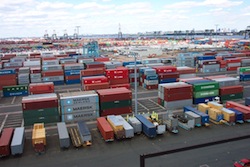Importance of Averting Nuclear Terrorism to be Highlighted in NPR
Featured Image
We are happy to serve you a daily summary of the day's top nuclear policy stories each morning, with excerpts from the stories in bullet form.
Stories we're following today:
U.S. to Make Stopping Nuclear Terror Key Aim - New York Times [link]
- When completed next year, the Nuclear Posture Review will order the entire government to focus on countering nuclear terrorists — whether armed with rudimentary bombs, stolen warheads or devices surreptitiously supplied by a hostile state — as a task equal to the traditional mission of deterring a strike by major powers or emerging nuclear adversaries.
- The nuclear review will affect how warheads are developed by the Department of Energy, deployed by the Department of Defense and limited through negotiations by the Department of State, as well as how the intelligence community and the military do their jobs and spend money. That could mean, for example, devoting less money to modernizing bombers, missiles and submarines, and more to surveillance satellites, reconnaissance planes and undercover agents.
- “The first — and in many ways the most urgent for where we are today — is the threat posed by nuclear proliferation and nuclear terrorism,” said the official, who was granted anonymity to describe the current draft of the review.
START and Beyond - New York Times Editorial [link]
- It is easy to dismiss arms control negotiations as a cold war anachronism. Former President George W. Bush did it for eight years. But two decades after the Berlin Wall fell, the United States and Russia still have some 20,000 nuclear weapons — a fact the Iranians and North Koreans eagerly raise when the United States and other powers try to curb their nuclear ambitions.
- That is yet another reason why it is so important for President Obama and President Dmitri Medvedev of Russia to move these negotiations ahead.
- Their work can’t stop there. Mr. Obama also needs to start pressing the Senate to ratify the Comprehensive Test Ban Treaty (signed by President Bill Clinton in 1996). The treaty is essential for curbing nuclear proliferation — it is nearly impossible for countries to build weapons without testing them.
- Twenty years later, the horrors of nuclear war haven’t gone away. President Obama is right to push hard on all of these fronts.
U.S. Says Nuclear Agreement is Near - Washington Post [link]
- President Obama said Friday the United States and Russia are "quite close" to reaching an agreement that would cut their nuclear stockpiles and allow the world's atomic giants to keep monitoring each other's arsenals. But they are unlikely to meet their goal of getting an accord by year's end.
- Analysts said some U.S. officials blamed the delay on Russian negotiators who had held out in recent weeks for concessions, believing Obama might make them to seal an arms-control treaty before receiving the Nobel Peace Prize on Dec. 10.
- "They thought Obama would cave. They were wrong," said Joe Cirincione, president of the Ploughshares Fund, which supports further disarmament.
GOP Senators Tie Arms Reduction Treaty to Building New Nuclear Weapons - Max Bergmann in the Wonk Room [link]
- GOP Senators sent a letter to the President this week indicating that they could only support a new Strategic Arms Reduction Treaty (START) with the Russians if the President agreed to build new unnecessary nuclear weapons.
- The GOP letter calls for the building of a new nuclear warhead, which they argue, in the words of the Washington Times, is essential to “modernize” the “aging nuclear stockpile.”
- The US does not need a new nuclear warhead. Our nuclear arsenal is doing just fine and remains the most sophisticated and advanced in the world. Kingston Reif in the Bulletin of Atomic Scientists rightly called out the critics:
Those who continue to argue that Washington doesn’t show enough interest in modernizing its nuclear weapons should be forced to answer a simple question: If given the choice, would they trade the U.S. nuclear arsenal for the Russian or Chinese nuclear arsenals? Clearly, the answer is no.
Laboratory Directors Brief Vice President Biden - LANLtoday [link]
- Laboratory Director Mike Anastasio joined fellow lab directors from Lawrence Livermore and Sandia for an in-person briefing of Vice President Joe Biden in the White House.
- The Vice President hosted the briefing as part of the Administration’s ongoing commitment to maintain a safe, secure, and effective nuclear arsenal, to the President’s vision of a world without nuclear weapons, and to ratification of the Comprehensive Test Ban Treaty. The discussion focused on the state of the stockpile, the future of nuclear weapons policy, and the vitality of the NNSA laboratories.



